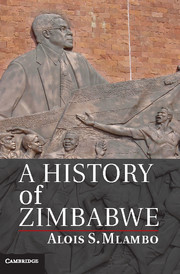Book contents
- Frontmatter
- Dedication
- Contents
- Figures
- Tables
- Maps
- Acknowledgements
- Timeline
- Notable Figures in Zimbabwean History
- 1 Introduction: Zimbabwe in Historical Perspective
- 2 Early States, c. 900–1900
- 3 The British Conquest State
- 4 Colonial Economy and Society to 1953
- 5 The Federation Years, 1953–1963
- 6 Nationalist Movements to 1965
- 7 Unilateral Declaration of Independence and African Response
- 8 Independent Zimbabwe, 1980–2000
- 9 The Crisis Years, 2000–2008
- 10 Conclusion: Zimbabwe Past, Present and Future Prospects
- Select Bibliography
- Index
- References
4 - Colonial Economy and Society to 1953
Published online by Cambridge University Press: 05 June 2014
- Frontmatter
- Dedication
- Contents
- Figures
- Tables
- Maps
- Acknowledgements
- Timeline
- Notable Figures in Zimbabwean History
- 1 Introduction: Zimbabwe in Historical Perspective
- 2 Early States, c. 900–1900
- 3 The British Conquest State
- 4 Colonial Economy and Society to 1953
- 5 The Federation Years, 1953–1963
- 6 Nationalist Movements to 1965
- 7 Unilateral Declaration of Independence and African Response
- 8 Independent Zimbabwe, 1980–2000
- 9 The Crisis Years, 2000–2008
- 10 Conclusion: Zimbabwe Past, Present and Future Prospects
- Select Bibliography
- Index
- References
Summary
Introduction
From the collapse of the first concerted African armed resistance to British colonialism in 1896–7 until the creation of the political and economic bloc known as the Central African Federation or the Federation of the Rhodesias and Nyasaland in 1953, Southern Rhodesia went through tremendous economic and political changes that established a modern state and changed the way in which the African majority lived. Significant economic advances were registered in mining, agriculture, transportation and manufacturing, while Africans were increasingly incorporated into the evolving capitalist economy, mostly as suppliers of cheap labour. The period also witnessed the advance of Christianity and Western education, which impacted extensively on the African population’s culture, belief systems, tastes and self-perception and which, arguably, facilitated the entrenchment of white colonialism in the country while at the same time contributing to the growing African political awareness that was to culminate in the anti-colonial struggle beginning in the 1950s. As the numerically inferior but politically and economically dominant white society worked hard to develop the economy for its own benefit and to keep a tight reign on the country’s political structures and systems, with an eye on controlling African aspirations, Africans explored various ways of challenging the status quo, ranging from peaceful mutual-help or solidarity associations and organisations, to workers movements, African independent churches and ultimately to political parties. This chapter traces these various developments that characterised colonial society and economy in the first half-century of European colonialism in Zimbabwe.
- Type
- Chapter
- Information
- A History of Zimbabwe , pp. 52 - 118Publisher: Cambridge University PressPrint publication year: 2014



